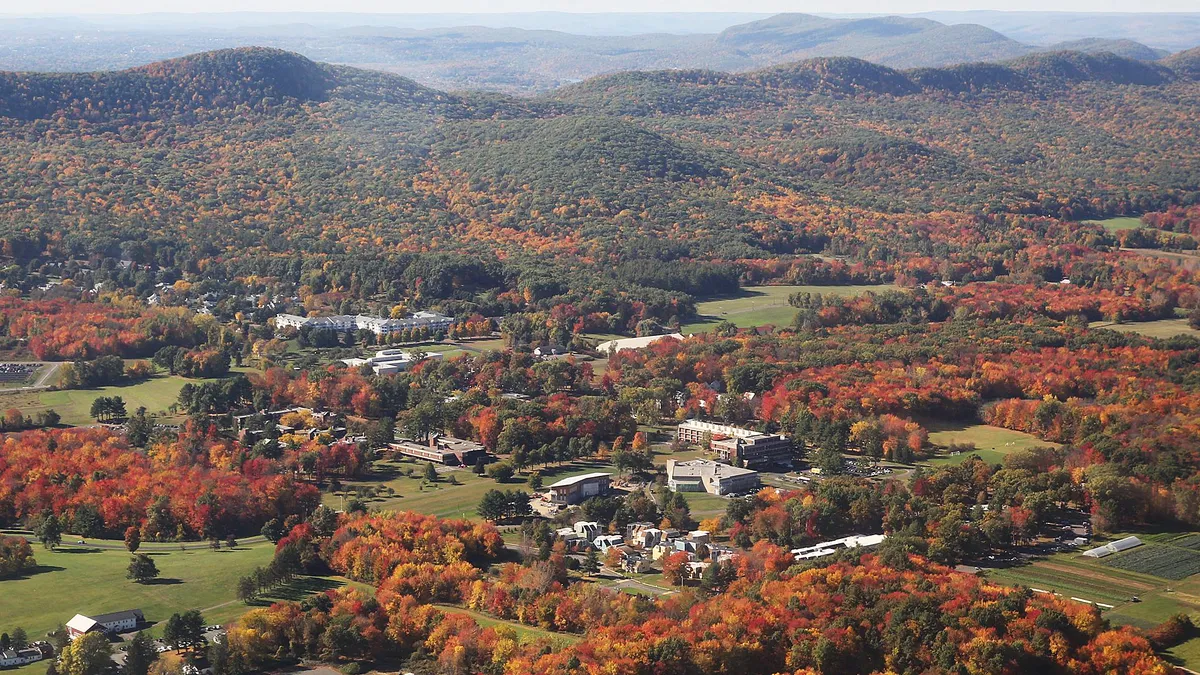Dive Brief:
- Nearing the end of a tumultuous year, Hampshire College, a small liberal arts school in Massachusetts, announced it will retain its accreditation after a vote Friday by its accreditor, the New England Commission of Higher Education (NECHE).
- The decision, which included a review of recent changes at the college and its five-year plan, is "a critical step toward securing a long future" for Hampshire, President Ed Wingenbach said in a statement.
- Hampshire must provide a full progress report for NECHE to review in December 2021. That will show the impact of efforts currently underway to expand enrollment, increase fundraising and overhaul its curriculum.
Dive Insight:
This year has been tough for Hampshire, which made its name in the last half-century by letting students largely design their own curriculum. The college has been subject to headwinds affecting small schools across New England, a particularly dense corner of higher education, including stagnating enrollment and competition that has spurred high tuition discounts.
Earlier this year, Hampshire announced it was in a precarious financial position and, as a result, would admit a smaller class for the next academic year and was seeking a partner to help it survive.
Those moves drew backlash and were followed by turnover in the college's leadership. In May, NECHE warned that the college may not be meeting its standards for institutional oversight, thus making its accreditation status vulnerable. It pushed a decision on that measure to November, allowing Hampshire time to sort itself out.
Bringing in Wingenbach, who joined Hampshire in August and has leadership experience at other small liberal arts schools, was part of its solution. Fundraising and a curriculum overhaul are also key to how Hampshire expects to move forward, sans partner.
On Dec. 3, the school will formally launch a campaign to raise $60 million in unrestricted operating dollars by 2024. It has already raised nearly $11 million toward that goal.
And it plans to return to full enrollment by the 2023-24 academic year, when it projects having more than 1,100 students per year, compared to the 732 enrolled as of fall 2019, according to a university spokesperson.
One way it aims to do that is by changing the structure of its curriculum, forgoing departments and majors and instead allowing students to take an interdisciplinary approach to design their academic experience. In particular, students will be encouraged to tackle "big questions" such as climate change, social inequity and artificial intelligence, the school said when it announced the change last month.
Hampshire and its peers aren't just trying to be more nimble in the face of economic and demographic headwinds. They are also facing more legislative oversight designed to spot schools that are struggling financially and intervene sooner to avoid an abrupt closure that leaves students with limited options for continuing their education.
Massachusetts Gov. Charlie Baker recently signed a law that would let the state keep a closer eye on private colleges' financial positions. Higher ed observers say it's a model other states could adopt. But colleges are wary of their poor financial status being disclosed, often extremely so, saying that doing so will deter students and potential donors from providing the revenue necessary to allow them to remedy their situations.










